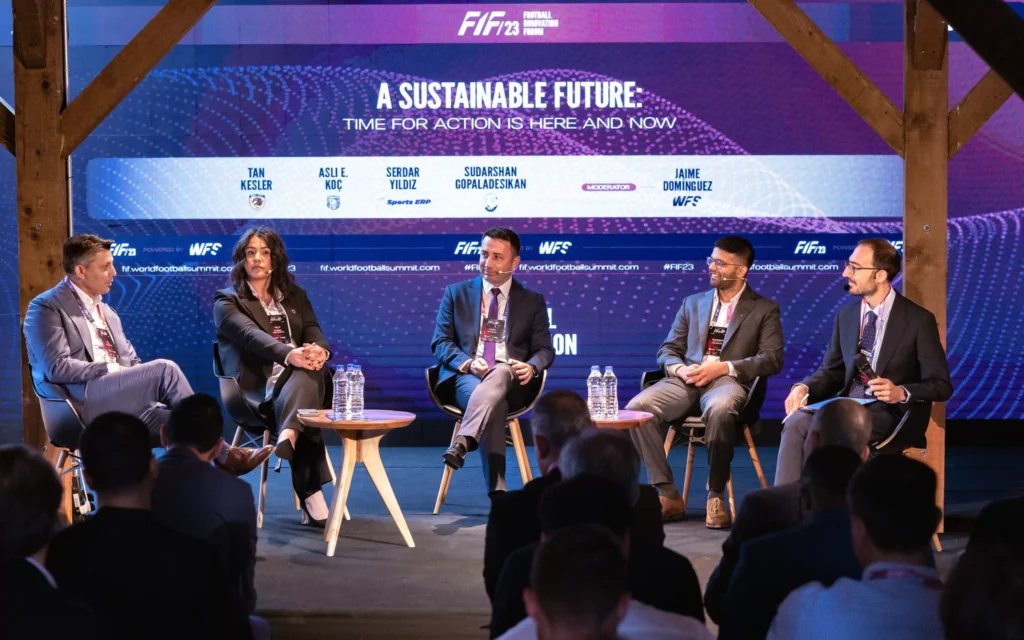As football clubs become more than just sports teams, their preoccupation on sustainability is transforming into two different concerns: sustaining the environment, and sustaining themselves. Once associated with nature, now sustainability is an all-round endeavour
Now more than ever, taking care of the environment is on everybody’s minds. After all, you can pick a football team, but you can’t pick another planet. The word on everybody’s lips is sustainability: the search for a way of working and living that respects our surroundings, protects nature and is responsible with everything, from emissions to the production of waste. Even in football.
In an industry where clubs have increasingly transformed themselves from just sports teams to international businesses, accountability is not only expected but demanded: both football sponsors and football fans are asking for their favourite clubs to be more responsible with the environment. And they have been delivering.
BEING SUSTAINABLE WITH A LITTLE HELP
“When it comes to the environment and climate change, brands are under pressure from consumers to demonstrate positive action. When maximising sponsorship revenue, sustainability is a meaningful differentiator”, says Brand Finance’s Football Sustainability Index 2023. Indeed, clubs are catching up however they can, even if at times it proves to be a challenge. That’s why some of them are resorting to partnerships.
For instance, The WFS Award winning Tottenham Hotspur Stadium, which will host World Football Summit’s 2024 Football Innovation Forum, partnered with battery technology, electric vehicle, solar, and critical power services company VivoPower to, as they explained it, “undergo an engineering review to pinpoint solutions and an array of potential projects to reduce both carbon footprint and energy costs”, which included rooftop solar panels, battery storage and custom microgrid controls. Then, by supplying 3 MW at the stadium, VivoPower guaranteed the venue’s power supply. All of this, as they explained, to achieve complete carbon neutrality.
ACHIEVEING SUSTANIBALE TRIPS
Asli E. Koç, Head of Marketing, International Partnerships and Sustainability at İstanbul Başakşehir Futbol Kulübü, has also resorted to partnerships to create a more responsible impact. “Often, the most tricky part when you decide to run a social or environmental initiative is to find the funding. It’s even hard for the bigger clubs, but it’s the hardest for the mid-sized and small sized clubs”, she explained during a panel in the 2023 Football Innovation Forum. “That is why we also need partners and alliances to make our impact even bigger. To spread the word to a wider community”.
As a result, what they came up with was a partnership with Turkish Airlines to create less polluting trips. “This season”, she explained, “we used biofuel in our flights to one of the cities in the European competitions. Biofuel is produced from natural resources, which is a very good innovation, but it’s a very expensive thing to produce”. Indeed, biofuel is fuel that is derived from biomass —that is, plant or algae material or animal waste— and its costs are currently 70% to 130% higher than petrol and diesel on the wholesale market depending on the crop used.
“So, even for the big clubs, it’s impossible to afford it throughout the season for all the matches”, she added. “And that’s why we need alliances. Our strategy is to create value for everybody, so thanks to the sponsors who are supporting us in our initiatives we always see sustainability as a matter of collaboration, not competition”.
THE POWER OF REINVESTING
However, strategies needn’t fall short on the grand scale of long-term plans. The concern for sustainability is important, but as it is tied with the financial resources of the club, there has to be a bigger strategy that isn’t directly tied with the performance on the field.
“If you want a sustainable future, you need to align the financial results of the game with the supporting results”, said Serdar Yildiz, CEO of Sports ERP, during a panel in the 2023 edition of Football Innovation Forum. “In a classic club, when you go higher than your expectations, you’ll make a profit. When you go below those expectations, you’ll make losses. But you need to create a self hedging mechanism through your contracts in order to prevent you from having a deficit in the financial side”.

“What I see in the future is just being able to, not just survive, but evolve in your own context and create better resources”, added Tan Kesler, Vice Chairman of Hull City AFC, during the same panel. “If you just put solar farms in your stadium, while great, is not enough. You cut down the electricity and it helps the environment, but the key comes with reinvesting those savings. Because, if you can’t create continuity and consistency and rely on stand-alone projects per year, this chain is due to, at one point and in different circumstances, simply break”.
REVIEWING PROCESSES
But, to achieve this, the current management of football clubs will have to question their own strategies not just once, but constantly. “In football, I think it is possible to continually review the processes that we do in order to hit our yearly objectives that we’ve set out for ourselves”, said Sudarshan Gopaladesikan, Director of Football Intelligence at Atalanta B.C during Football Innovation Forum 2023. “And, I mean, I would hope that everyone would answer affirmatively to that question”.
To exemplify this, Gopaladesikan names a trip he had recently made to the Italian city Modena, where the highest quality balsamic vinegar has been made for approximately a thousand years following the same tradition. “Maybe they would say that they don’t need to innovate, but even that choice would mean innovation because it implies the constant reviewing of processes. I think it’s all linked”.
FOOTBALL IS NOT JUST A GAME
But to really put this mindset into perspective, it is necessary to understand that football is not only a game anymore. It is an important business that needs to be managed carefully, and there are two sides to it: the sporting side, and the business side. And, according to Yildiz, “only if we can see a balance of importance between the two, we can talk about sustainability”. “And right now”, he added, “the industry is not sustainable”: “So many clubs are going bankrupt after getting important sporting results on the pitch because they didn’t pay enough attention to the business side of the game”.

“In the last decade, UEFA and professional leagues have been trying to establish regulations in order to prevent us from going bankrupt by spending more than what we have, because we seem to not be able to do this by ourselves”, he continued. “It may be silly, but have you ever seen a regulation preventing us from playing with less than two defenders? We seem to understand that if we do this, we lose the game. But in terms of budgets we don’t see things as clearly and neither do the club managers, the media, fans and the members. They need to understand the importance in order to survive. In order to be sustainable, you need to manage this business”.
RESPONSIBLE IS BECOMING COOL
But what does sustainability mean, anyway? It seems like it is a global endeavour. Sustaining an industry, a planet, and a business. Altogether. And younger generations are valuing it more than ever.
“Nowadays, people who are coming up are not so much interested in who is the Premier League champion”, Gopaladesikan concluded. “I mean, that’s the cool thing, and of course that’s always going to be cool. But now people are celebrating the Forest Green Rovers and the business models of Brentford and Brighton. People are celebrating strong academies and cool, social, innovative projects that different clubs are doing. And, perhaps, what it means to be a champion and what people are celebrating has changed from just being first placed on a table or picking up a trophy”.
“I think that’s been an amazing evolution of sustainability, and that’s something that will carry things forward in the future. And if we can use innovation to reach the performance objectives that each club has set out for themselves, whether it’s top table, mid-table, or just surviving from relegation, while spending less on their wage, perhaps that does free up some funds to be able to put into other places. Combining that with leadership in strategy, we can make better impact and better change”. The way to pave the road to sustaining football, which is something we in World Football Summit strive to achieve.
If you or your business is working towards a better industry as well and want to share your innovation with the world, get in touch with our team and let us help you explore the opportunities that WFS events can open for you!
